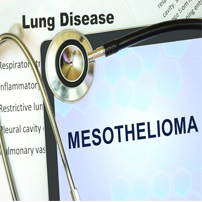 Researchers from the University of Toronto have discovered a correlation between the thickness of pleural mesothelioma tumors and treatment outcomes. This correlation is considered a breakthrough because it provides physicians with another tool in deciding the best treatment options for combatting the aggressive cancer.
Researchers from the University of Toronto have discovered a correlation between the thickness of pleural mesothelioma tumors and treatment outcomes. This correlation is considered a breakthrough because it provides physicians with another tool in deciding the best treatment options for combatting the aggressive cancer.
When treating mesothelioma, physicians’ primary objective is typically to prolong the life of the patient. Because the cancer is aggressive and often evades detection until the late stages, the mortality rate is absolute. The disease is relatively rare, accounting for only about one percent of cancer cases diagnosed each year. Because of its rarity, fewer research dollars are devoted to finding a cure than more common forms of cancer, such as breast cancer. Still, as many as 2,500 lives are lost in the U.S. every year due to mesothelioma.
Fortunately, the small army of researchers working to improve treatment options for mesothelioma are making progress. Scientists at the University of Toronto measured tumor thickness at nine points in the chest, lungs, and diaphragm in patients undergoing surgery to remove the mass. This involved an aggressive procedure known as Surgery for Mesothelioma After Radiation Therapy (SMART). Although not a cure, the surgery may extend life by removing most of the cancer.
In measuring tumor thickness, the team compared their findings to less-invasive measurements taken during pre-surgery stages and found a high-degree of accuracy between the two. They also found higher rates of metabolic activity in the thicker tumors.
The team maintained contact with the patients and found that after 19 months, most had suffered relapse and slightly more than half had lost their battle. They further found that those who had died had tumors that were thicker upon initial examination than the patients who were still living. The team accounted for other variables such as subtype epithelioid and whether spreading to the lymph nodes had occurred and found that there remained a direct correlation to tumor thickness and outcomes.
These findings are important for patients and treatment teams because it means they can measure the tumors using traditional methods and based on those findings recommend the best course. Physicians may decide that a radical approach such as SMART will be effective in extending life for patients with thinner tumors. Those with thicker tumors may opt to avoid the surgery. There is no wrong choice, but patients are best served when provided the best information and prognosis.
The Philadelphia mesothelioma lawyers at Brookman, Rosenberg, Brown & Sandler are committed to helping victims of this terrible cancer recover the financial compensation they deserve. If you know someone who is suffering from pleural mesothelioma, we would like to help. Contact us online or call 800-369-0899 today to schedule a free consultation in our Philadelphia office, where we represent clients throughout Pennsylvania and New Jersey.